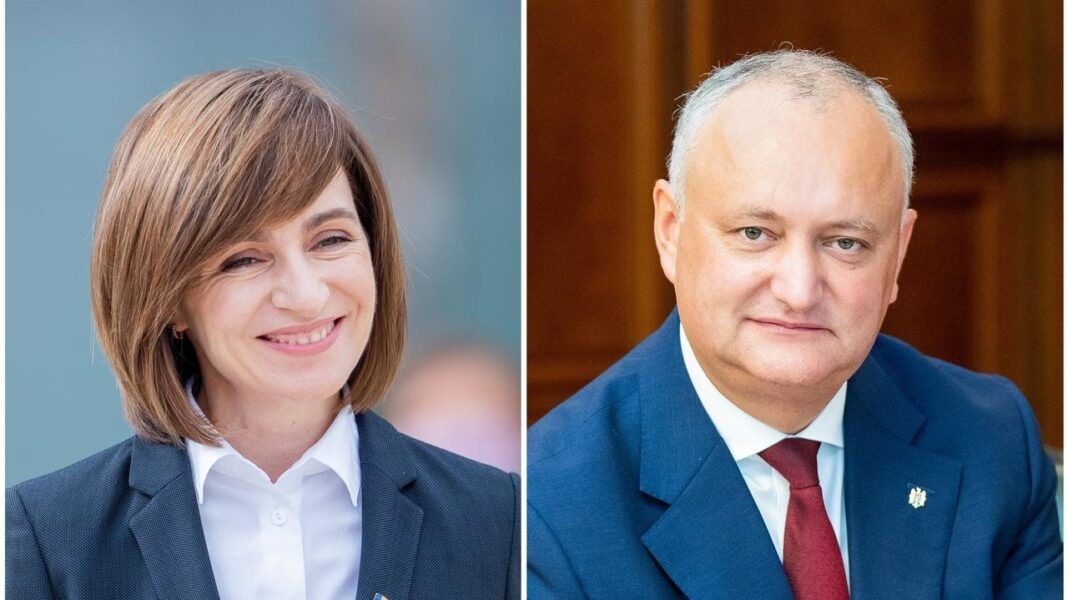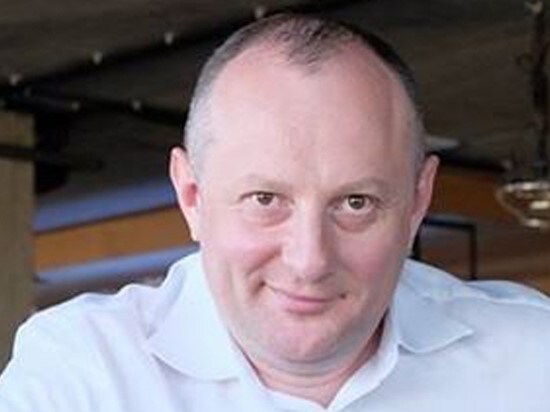The presumably Pro-EU opposition candidate Maia Sandu won Moldova's presidential runoff vote on November 15, 2020, defeating incumbent President Igor Dodon. Before the first round of the elections Russian President Vladimir Putin had effectively endorsed Dodon when he stated "We very much hope that at the next elections in Moldova, the Moldovan people will appreciate the efforts that the current president of the republic [Dodon] is making to build relations with Russia." [1] Russia was also reported to have sent advisers to help Dodon's campaign. [2] During his presidency Dodon was a frequent visitor to Moscow, which played up his 2016 victory over Sandu. [3]Yelena Roitburd writing in Mk.ru, lamented Dodon's defeat inter alia because "The President consistently advocated the independence of Moldova, for a balanced foreign policy, insisted on international recognition of its neutral status, always stressed how important it is to preserve the historical memory of the role of the Soviet people, of which the Moldovan people were a part, in the defeat of fascism. On his initiative, all veterans of the Great Patriotic War were awarded the country's highest award - the Order of the Republic. And this is like a knife to the throat for all attackers of the president." In contrast, she claimed that Sandu was equivocal about Romania's wartime leader and Hitler ally Marshal Antonescu. [4]
Given this background, Russian commentators debated whether the elections in Moldova represented yet another setback to Moscow's position in the areas formerly controlled by the Soviet Union. While Mikhail Demurin in Regnum media was alarmed by the results and called for tough measures, other commentators believed that the pro-European versus pro-Russian divide in Moldova was overdrawn, the election was fought and won over other issues, and Sadu would have to be conciliatory towards Russia. Mk.ru's observer Mikhail Rostovsky described Moldova as a thoroughly corrupt country, whose fate and political orientation should not concern Moscow that had more important problems to contend with.
Below is a survey of Russian responses to the Moldovan elections.

Maia Sandu (l) and Igor Dodon (Source: Polishnews.co.uk)
Regnum senior columnist and former Russian diplomat Mikhail Demurin was concerned by the results and urged a stern Russian response, as he feared that Sadu would target the breakaway state of Transnistria.
"The victory in the Moldovan presidential elections of Maia Sandu, the leader of the pro-European Party of Action and Solidarity is an inconvenient reality for us, fraught with aggravation in a number of issues related to Moldova and, first of all, in the settlement of the Transnistrian problem...
"The motives of politicians are one thing, and those of ordinary voters are another, and they have expressed themselves quite clearly: Western European opportunities and the Western project itself, with all its costs, today for Moldovans look more attractive than the opportunities associated with Russia. The majority of Moldovans, apparently, do not consider in Russia an indigenous civilizational project oriented towards the outside world, opposed to the Western one and, most importantly, capable of overcoming it.
"Our country is now under a series of attacks from different directions, Transnistria under Maia Sandu, I think, will be the next. We must prepare the toughest reaction to the anti-Russian actions of the new administration. I am sure that such actions will not be long in coming.
"In Moldova, our country should now start work aiming at the long-term perspective. It's not the relations with Moldova per se that are important, what's important is to place a roadblock to the growing European Union offensive. In order to achieve this, the EU's periphery should be weakened as much as possible, [we need to make] the peripheral countries oriented towards the EU as heavy a burden as possible for the Europeans. The Moldovans must feel the consequences of making a choice in favor of forces hostile to our country." [5]

Mikhail Demurin (Source: Ria.ru)
Mikhail Rostovsky, Moskovsky Komsomolets' lead columnist believed that the results were inconsequential for Russia. He understood why some in Russia were concerned:
"Suffering from coronavirus President of Ukraine Volodymyr Zelenskyy, took the time to call his newly elected colleague in Chisinau and invite her to Kiev - this is perhaps all one needs to know about the new supreme leader of Moldova, Maia Sandu. Now we have an addition to the list of Russophobic presidents of the former USSR. Igor Dodon, who loved to talk about friendship with Russia, was replaced by a madam who knows how to speak Russian, but prefers not to do so for ideological reasons."
SUPPORT OUR WORK

Yet, official Russia took the results calmly because Moldovan politics resembled a swamp.
"The Chisinau policy for many years resembled a viscous 'swamp', in which politicians who promise to 'restore bridges' with Moscow or to include Moldova in the 'European family' throw themselves into."
If Russia had really felt that the outcome was crucial, it could have decided the elections in Dodon's favor: "According to very rough and approximate estimates, there are at least 400 thousand Moldovan guest workers in Russia. If these people were to be mobilized for the elections (and in Russia they both love and know how to carry out such 'electoral special operations') then nothing would be left of the [voting] advantages of the pro-Western Maya Sandu. Instead of the lady, who was celebrated for her fierce battle with education in the Russian language (when she was minister of education), the 'pro-Russian' Igor Dodon would have been elected to the presidency for the second time in a row.
"Why, in connection with Dodon, do I prefer to put the word 'pro-Russian' in quotes and why didn’t this politician receive powerful support from Russia at the elections? I suspect both of these questions have the same answer. The point is not, that Moscow now, even without Dodon’s problem, has a lot on its plate: Covid, Belarus and the South Caucasus. The point is that the first term results of the 'pro-Russian' President of Moldova, from the Kremlin’s perspective, were rather modest or, one might even say, disappointing.
"Though Dodon has made an enormous number of beautiful statements about improving relations between the two countries, he wasn’t able to change anything in practice. For example, the solution to the Transnistrian problem, which is extremely important for Moscow, didn’t move one iota.... Looking from Moscow’s perspective, Dodon's presidency turned out to be an even worse remake of Vladimir Voronin’s rule (Russia's previous 'great friend' in Chisinau). When he came to power in 2001, the former leader of the Moldovan Communists also promised a lot. But when it came to signing the Russian plan for the federalization of Moldova (the “Kozak memorandum” [establishing a federation between Moldova and Transnistria], which has already become the stuff of legend), Voronin walked away not too gracefully.
"In general, getting a Moldovan politician to fulfill his obligations is almost an impossible task. The political process in Chisinau is a Brownian movement, during which everyone quarrels and fights with each other, and then regroups in the most bizarre way. The only thing that remains unchanged in the course of this regrouping is the well-fed life of the elite against the background of the permanent economic crisis and the constant human capital flight abroad. Of course, something similar can be said about almost any country of the former USSR. But Chisinau still has its own specifics. Those who in Moldova are formally considered to be irreconcilable ideological opponents, in fact, are often partners in illegal business. Experts claim, for example, that such 'ties' of hidden business partnership are the strongest link between the Chisinau elite and the elite of the allegedly rebellious Transnistria in Tiraspol. There is even an opinion that because of this the situation around the unrecognized republic has not changed for many years. The Moldovan political elite (in this case, I use this term in its broader sense, which includes not only elite of Chisinau) is comfortable at the forefront of a constant conflict between Russia and the West. The local 'nobility has long learned how to monetize this conflict and is constantly using it to its advantage.
"Will Maya Sandu be able to change something in this swamp? Or will everything continue to be as before? The new president is definitely a more energetic and ideologically charged politician than her rather inert predecessor. But she will have to act within the same restrictions as Dodon...
"Maia Sandu will most likely have to preside amidst the same political swamp, which drowns any impulses, both positive and negative. This is why Moscow was not particularly impressed by her triumph. 'Empresses' come and go, and life in the swamp goes on as usual."[6]

Mikhail Rostovsky (Source: Mk.ru)
The experts surveyed by Vzglyad's Irina Yarovaya essentially shared Rostovsky's view that the results were not a disaster for Russia but without his disparagement of Moldovan politics.
Vitaly Andrievsky, head of the Moldovan Institute for Effective Politics claimed that the election was not about Russia versus Europe. Sandu ran a campaign stressing unity while Dodon focused on the social divide. Dodon also offended the Moldovan diaspora that had a right to vote and repatriated part of their income to Moldova. Dodon failed to woo the voters of candidates eliminated in the first round of voting.
Another issue raised by Dodon that failed to resonate with the voters was his stress on Western funding for his opponent. "For many Moldovan citizens, this is a false agenda. They are worried not about Western NGOs, but about the authorities' inability to fight corruption and create new job places,” explained Andrievsky.

Vitaly Andrievsky (Source: Baltonline.md)
The deputy director of the Institute of CIS Countries Vladimir Zharikhin believes that Dodon was hampered by constitutional restraints that award the prime minister broader powers than the president.
"Now Sandu will face the very same problems. The coronavirus epidemic is raging in Moldova, there are restrictions on the movement of those who travel to Russia and Europe to work. In addition, the republic's political elite is extremely peculiar: many members of this elite have no principles and easily move from one political camp to another.
Also, one cannot ignore the traditional problem of Transnistria, which continues to keep Moldova from uniting with Romania. All these problems are not going anywhere.”
Aleksey Martynov, director of the Institute of the Newest States, is also convinced that Sandu's victory will not have a serious impact on Russian-Moldovan relations. He believes that the dichotomy that divides candidates into pro-Western and pro-Russian is long outdated, when the post-Soviet countries are concerned.
"Moldovan policy is entirely based on the fact that the leaders of the parties feed themselves wherever possible. Sandu, for a long time has been nurtured by Western international frameworks. For a time, Dodon also went through this school. But then he switched to pro-Russian rhetoric, and Sandu, accordingly, remained closer to the West." –
"But her victory does not cancel Moldova’s economic dependence on Russia. Sometime after Sandu takes office, she will ask for some discounts on [natural] gas, as is usually the case with post-Soviet leaders, and will look for new forms of cooperation with Russia.” - predicts Martynov."
Andrievsky agreed and noted Sandu's post-election pledge to build a pragmatic dialogue with Russia, as well as with other states, including Romania, Ukraine, the United States and the countries of the European Union.
According to Andrievsky: "Sandu hopes that Russia will not follow the policy of confrontation, because she clearly does not intend to pursue an anti-Russian policy." [7]
[1] Tass.ru, October 22, 2020.
[2] Voanews.com, November 16, 2020.
[3] See MEMRI Special Dispatch No. 6696, Russia's Orbit - Part III - The New Pro-Russian President Of Moldova, November 29, 2020.
[4] Mk.ru, November 18, 2020.
[5] Regnum.ru, November 16, 2020.
[6] Mk.ru, November 16, 2020.
[7] Vz.ru, November 16, 2020.




